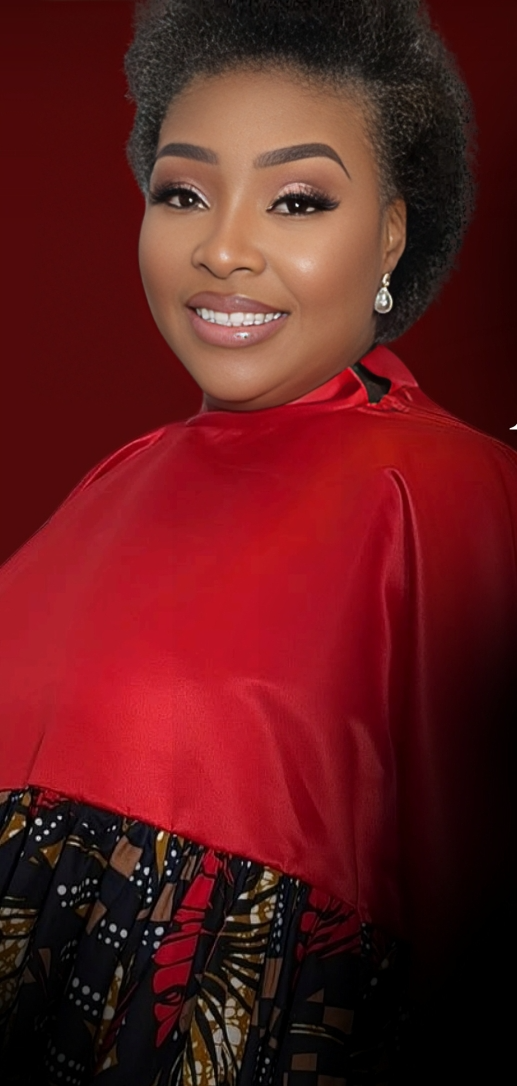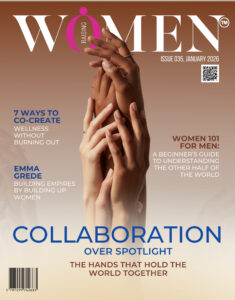From Sowetoto the World! Celebration World! Celebration of Music,Purposeof Music, Purpose & Ubuntu & Ubuntu
by Francisca Sinjae
For decades, Yvonne Chaka Chaka has beenmore than a voice, she has been a movement.From her early days as Africa’s beloved “Princessof Africa” to her tireless work in philanthropyand women’s empowerment, she has shapedcultures and driven change. Now, as she marksher 60:40 celebration, commemorating 60 yearsof life and 40 years in the music industry, herlegacy stands as a testament to passion,resilience, and purpose.
In this exclusive interview, Yvonne reflects on herjourney, the lessons she’s learned, and what thismilestone means to her. From breaking barriersin the music industry to championing healthand education initiatives, she shares her wisdomon longevity, reinvention, and staying true toone’s mission.
Q: Looking back at your journey, what emotions come to mindwhen you think of your early days in the music industry?
A: In the next few months, I’ll be celebrating 40 years in thisindustry. It feels like such a short time, yet it’s been a long andimpactful journey. I’ve had numerous requests for interviews,podcasts, and magazine features, but I’m selective about whichones I accept.
I turn 60 next month, and looking back, I’m just grateful to Godfor the platform I’ve been given. This career has allowed me toexpand my horizons, empower women, and establish my ownradio station, where I help young women from disadvantagedcommunities share their voices.
I believe every job we do is God’s work; He plants us in placeswhere we can make an impact. Some of us do it well, some makemistakes, but at the end of the day, I know I’ve changed lives justas my own life has been changed.
Q: Your music has been the soundtrack of many childhoods.What does it mean to you to be a part of so many people’snostalgic memories?
A: I come from Soweto, where children are raised by an entirecommunity. If I had grown up in an isolated setting, I wouldn’t bewho I am today. Music wasn’t my original path because I wantedto be a chartered accountant, and my mother wanted me to be alawyer. I never planned to be a musician. But when I found myselfin the industry, I realized the power of music as a tool forawareness. Through songs like I Cry for Freedom and Africa isCrying for the Children; I was able to raise awareness. I remembervisiting Nigeria and going to the Shrine, listening to Fela Kuti. Heeducated us through his art while entertaining us. That’s whatmusic should be, something that wakes people up, raisesawareness, and inspires action. For me, music is a means ofstorytelling, just like magazines, theater, and art. It’s a way to shiftconsciousness.
Q: What was a defining moment in your career that made yourealized your impact extended beyond music?
A: I started singing in 1985, but I never saw longevity in music. Mymother disapproved, so I had to prove to her and myself that Icould build a lasting career. When I started hearing my songs onthe radio and seeing myself on TV, I realized my career was morethan just music. It was a platform to educate, empower, andinfluence change. For me, the real fulfilment comes fromstepping outside my comfort zone and not just for myself but alsofor my community.
Q: The music industry has evolved tremendously. Whataspects of the past do you miss, and what excites you abouttoday’s industry?
A: Music should evolve, just like everything else. Look at AI andhow it’s reshaping industries, making things more efficient. The same applies to music. We were inspired by artists like MiriamMakeba, Cesária Évora, and Onyeka Onwenu. Each generationbuilds on the one before it. I’m happy with how African music istaking the world by storm.
However, challenges remain. Piracy is a big issue. Many artistsleave for other countries to secure their careers. As the industrygrows, we need policies to protect creatives. This isn’t justentertainment, it’s a major economic sector.
What excites me about today’s music are the rhythms, thecreativity, the collaborations! African music makes you dance, it’salive. I love how young artists are blending past influences withnew sounds, creating fresh genres.Look at Amapiano, it’s a South African sound, but Ghana andNigeria have their own unique interpretations. Music shouldnever be stagnant; it should keep evolving.
Q: Nostalgia is often linked to storytelling. What’s a personalcareer story that holds a special place in your heart?
A: Absolutely. Music is storytelling, just like theater. Whether it’s afuneral, a wedding, or a war, music conveys emotion. It’s anAfrican thing that we sing during burials, weddings, andcelebrations. Even if I don’t speak Yoruba or Zulu, I can feel the emotion in the music. It’s a universal language.
Q: What role do African legends like yourself play in shaping the nextgeneration of artists?
A: I hesitate to call myself a legend because many came before me and pavedthe way. In South Africa, it wasn’t always easy as there were places where onlywhite performers were allowed. People like Miriam Makeba and OnyekaOnwenu inspired us to push forward. Now, it’s our turn to pass the baton.The most important thing is to respect your craft and your audience. Thecreative industry can sometimes lead people to lose themselves, but stayinggrounded is key. To young artists. Yes, it’s great to be a superstar, but neverforget who you are and where you come from. That will always guide you.
Q: Beyond music, your humanitarian work has been just as impactful.How has this journey shaped you as a person?
A: I guess for every person, you find it easy to help your neighbour.Humanitarian work has always been there in our neighborhood, in oursociety. Obviously, you will find people who would give it a name, like Ubuntu.Ubuntu has always been there. I grew up in a space where Ubuntu was anormal thing. If I didn’t have food at my mother’s house, I would go to myneighbours and ask for something, and it would be very easy for them to giveit to me, so I would never go to bed without eating. That is Ubuntu, but theworld gives it labels like “humanitarian” or “philanthropist.” For me, givingback has always been second nature. It wasn’t a decision; it was simply theright thing to do.
So, when I was given this platform to perform, to travel, to engage withdifferent communities, and to see the world, it was easy to say, I’m given aplatform and it’s my right, but what do I do? Do I just take and take, or do Igive back?
Having a platform means having a responsibility. So, when I advocate formalaria prevention or distribute long-lasting mosquito nets, I don’t see it ascharity but I see it as taking care of my people. When I provide sanitary padsto young girls, it’s because I was once in their shoes. I know what it’s like to gowithout, so if I can ease someone’s burden, even in a small way, I will. I don’t doit for accolades. I do it because it’s the right thing to do.
Q: So, humanitarianism, in your view, should be a way of life?
A: Absolutely. In Africa, we’ve always been there for each other. We didn’tneed fancy words like “philanthropy” or “corporate social responsibility” tojustify kindness. Helping a neighbour or sharing what little you had, that wasjust our way.But now, things have become so commercialized. People hesitate beforehelping, thinking, “What’s in it for me?” That’s not how I was raised. Givingshould be instinctive, not calculated.
Q: If you could go back and give advice to your younger self when youfirst started in the industry, what would it be?
A: I wouldn’t change a thing. The journey, with all its ups and downs, wasworth every step. I grew, I made mistakes, I learned. I started with nothing.There were people who doubted me, who thought I’d be a one-hit wonder.
But I stayed focused. I wasn’t reckless, I didn’t live beyond mymeans, and I always remained mindful of those around me. Even asI found success, I never lost sight of my roots.If I were to advise 20-year-old Yvonne, I’d tell her:
“Keep going. Stay true to yourself.People will doubt you, but your purposeis bigger than their opinions. Mistakeswill happen, but don’t dwell. Learn and move forward.”
And that’s exactly what I’ve done for the last 40 years.
Q: How do you want people to remember Yvonne Chaka Chaka,not just as an artist, but as a person?
A: I don’t think about that. I can’t control how people remember me,and honestly, why should I? Life is for the living. People often ask,“What legacy do you want to leave?” But I don’t live for legacy. I livefor now. I do what I can, while I can. If people remember me, that’sfine. If they don’t, that’s fine too. What matters is that I did my part while I was here.
Q: If you could relive one moment in your career, what wouldit be and why?
A: Oh my, I don’t think I can choose just one! Every moment inmy life has been a blessing. The fact that I’m turning 60, that I canstill breathe, travel, and do what I love, now that’s a gift in itself.I don’t dwell on the past. Yesterday was yesterday. Today is here,and tomorrow is unknown. So, I cherish each moment withgratitude. The past shaped me, but the present is where I live.
Now, is what matters. I’m grateful for my family, my children, myhusband, my friends. Even those who criticize me because theyall play a role in my journey. You can’t be everything to everyone.People will always have opinions, but you don’t live for them, youlive for yourself and for the good you can do. The most importantthings in life are love, kindness, and respect. I may not be amillionaire, but I’m rich in purpose, and that’s what truly matters.







